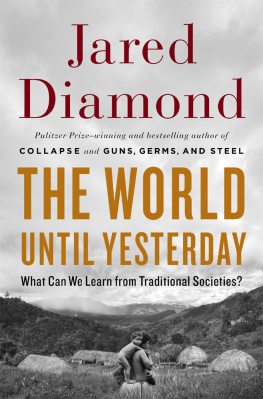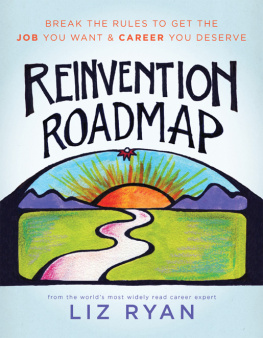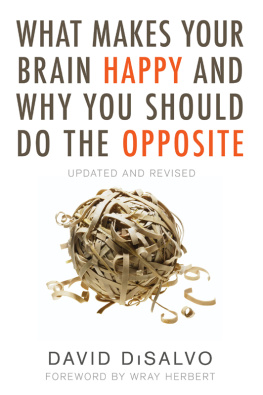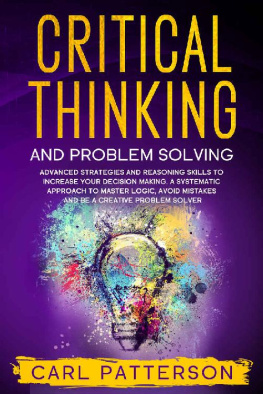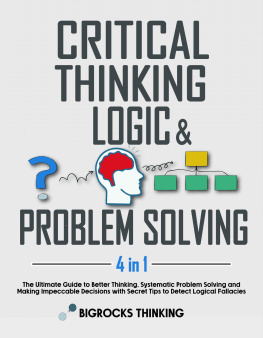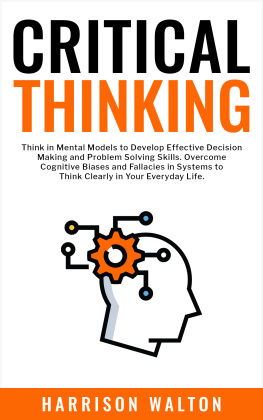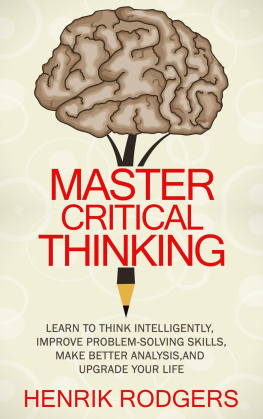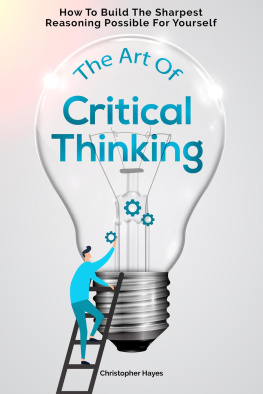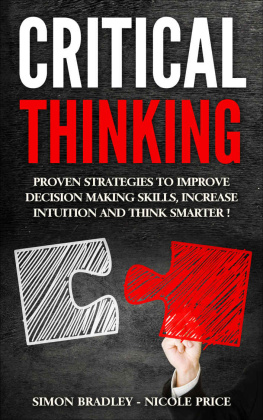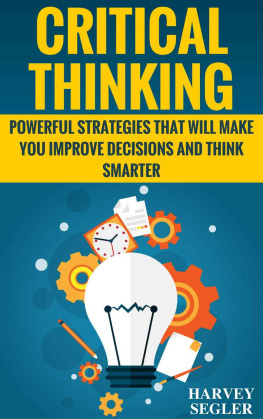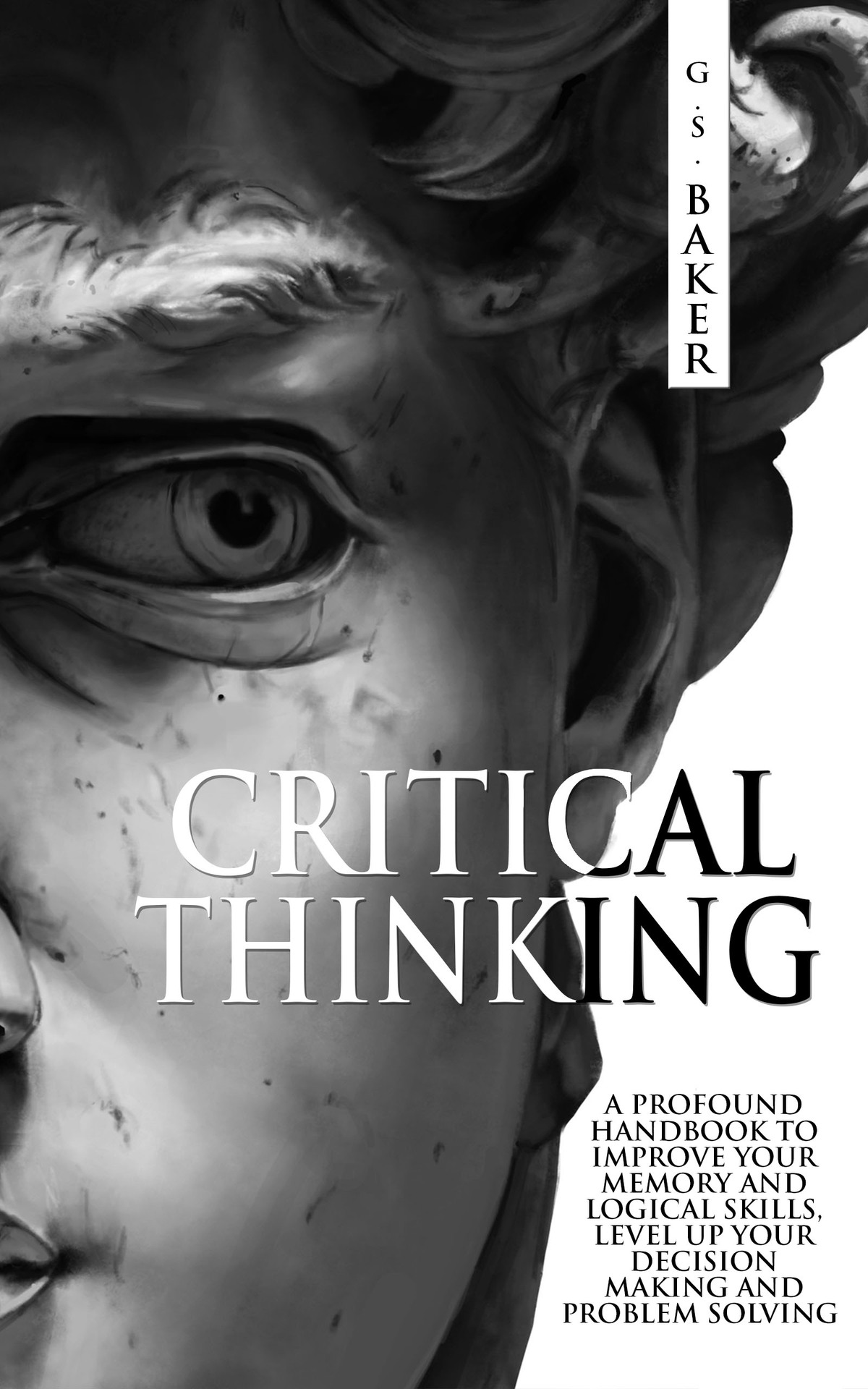CRITICAL THINKING
A profound handbook to improve your memory and logical skills, level up your decision making and problem solving!
G.S. Baker
Disclaimer
The information contained in " CRITICAL THINKING" is meant to serve as a comprehensive collection of strategies that the author of this eBook has researched about. Summaries, strategies, tips, and tricks are only recommendations by the author; and reading this eBook will not guarantee that one's results will exactly mirror the author's results. The author of the eBook has made all reasonable efforts to provide current and accurate information for the readers of the eBook. The author and his associates will not be held liable for any unintentional errors or omissions that may be found. The material in the eBook may include information by third parties. Third-party materials comprise of opinions expressed by their owners. As such, the author of the eBook does not assume responsibility or liability for any third-party material or opinions. Due to the progression of the internet or the unforeseen changes in company policy and editorial submission guidelines, what is stated as fact at the time of writing this eBook may become outdated or inapplicable later.
The eBook is copyrighted in 2020 with all rights reserved. It is illegal to redistribute, copy, or create derivative work from this eBook whole or in part. No part of this report may be reproduced or retransmitted in any form whatsoever without the written expressed and signed permission from the author.
TABLE OF CONTENTS
CHAPTER 3
LEARNING FROM CRITICAL THINKERS
The critical mind that nurtures critical thinking
CHAPTER 5
BETTER DECISION MAKING
CHAPTER 10
CRITICAL THINKING STRATEGIES
INTRODUCTION
C ritical Thinking is understood as the process of evaluating and choosing, through reasoning and will, a certain option in the midst of a universe of possibilities, with the purpose of solving a specific situation, whether it is the personal field, vocational, family, social, labor, economic, institutional or business, among others.
To that extent, the decision-making process must be distinguished from routine everyday choices, such as preferences for the attire of the day, the lunch menu, etc., which do not necessarily imply a process of rational scrutiny.
Decision-making involves the evaluation of a series of conditions and variables of a scenario, against which it is necessary to choose an intervention strategy by the subject involved, be it an individual or a collective (companies, institutions, communities). Therefore, it is a very complex process.
CHAPTER 1
WHAT IS THE CRITICAL THINKING?
We can read that the man arrived at the Moon or that he never succeeded, observe the report of the results of a scientific experiment or we can watch on television what we believe can be a mass demonstration.
We can believe in it or not do it, taking into account that what comes to us from the media, what we read, what they tell us ... all this can be the product of an error or due to biased interests or opinions.
Today we have to be able to doubt everything, reflecting and evaluating what we perceive and / or what communicates to us. That is why we can ask ourselves about the ability to perform this screening. What is critical thinking and how to develop it?
Critical Thinking: Defining the Concept
Critical thinking is the capacity manifested by the human being to analyze and evaluate the existing information regarding a subject or given, trying to clarify the veracity of said information and reach a justified idea about it, ignoring possible external biases.
We apply critical thinking to try to discern the reality of what they tell us and perceive from the analysis of the reasoning used to explain it. In a manner analogous to what Descartes proposed, it is about doubting the information, dogmas and absolute axioms that surround us until we ourselves can give them truthfulness or otherwise ignore them. With this, we seek to have a justified idea of reality and not blindly accept what others tell us.
This type of thinking, linked to skepticism, helps the human being to create his own identity, appearing throughout development and being especially visible in adolescence and from it. It is not about bringing the opposite to the world, but about being able to elaborate our own point of view based on the verification and contrast of data. What is intended with critical thinking is to eliminate fallacies and biases that compromise the objectivity of the investigated data.
Critical thinking is closely related to other capabilities such as creativity, logic or intuition, allowing us to develop new strategies and ways of seeing and perceiving things. Having a good capacity for critical thinking helps us avoid conformism and move forward as human beings, avoiding that there is only one way of seeing the world.
Why is critical thinking important?
Having critical thinking can change the whole dynamics of the workplace. We can analyze, for example, that personal problems among employees often affect their earnings and the well-being of teams. When people have the critical thinking, that doesn't happen: Nobody lets work get mixed up with their personal lives, and everyone tries to maintain the friendliness to get projects going as planned.
Critical thinking also has great advantages for leaders and bosses because they often find themselves having to resolve problems and conflicts between employees. It is undeniable that in such situations leaders can agree with one of the parties involved. However, impartiality is essential to maintain a firm position at such times. Critical thinking distances personal opinions and focuses only on facts and rationality.
But do not think that this kind of thinking is only rational: it also makes room for creativity. Someone who is able to think critically often has more ideas and suggestions, which always leads to innovation in company projects. Taking away your personal opinion gives you room to think about other opinions - and this is where the best ideas are born.
Even customer service is better when the employee has critical thinking because it leads to empathy. When we set aside our own beliefs to analyze a situation, we can better understand what the other is going through. In this way, the employee understands the customer's needs and can better serve them.
No wonder critical thinking is seen as an essential skill for every good student or employee. Knowing how to question, and especially if questioning, is important to make room for knowledge and the emergence of new ideas. Those who live with a colleague who thinks this way know how their ability to resolve conflicts and understand others is essential in the workplace.
How to develop critical thinking?
In order to start developing your critical thinking, it is important to invest in three different aspects. However, it is important to remember that, above these qualities, critical thinking is an exercise that must be constantly practiced to perfection.
1. Curiosity
Asking questions, not being satisfied with easy solutions and seeking more knowledge is the tripod of curious people. Leave acceptance aside and invest in curiosity.
2. Understanding
Understanding the full picture of a problem is important to becoming a critical thinker. If you focus only on one small aspect, you may not be able to ponder it effectively.
3. Logic


